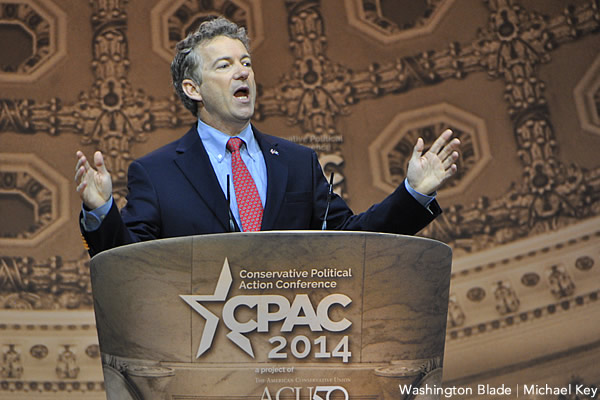News
Conservative struggle over gay rights emerges at CPAC
Santorum says he doesn’t ‘want to talk about redefining marriage’
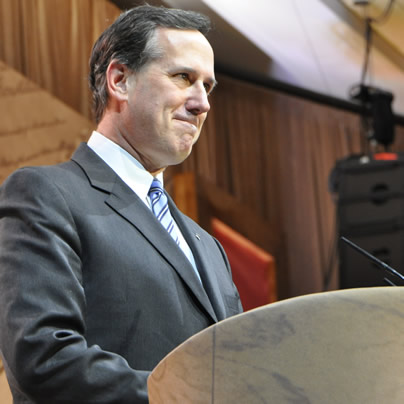
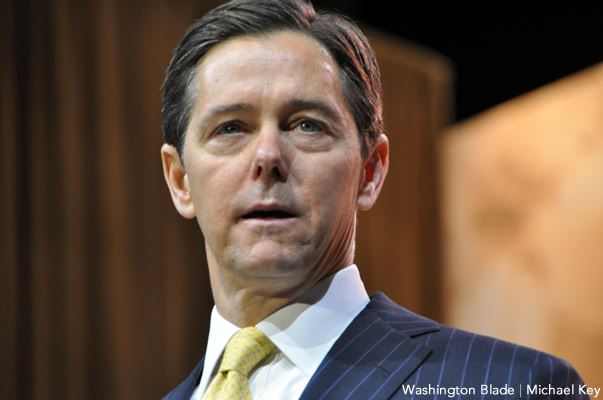
Ralph Reed speaking at the 2014 Conservative Political Action Conference. (Washington Blade photo by Michael Key)
NATIONAL HARBOR, Md. — To witness the conservative movement’s struggle with the widely held perception that nationwide marriage equality is imminent, you need not look further than the stage of the 2014 Conservative Political Action Conference.
After remaining silent on the first day of the conference, voices against same-sex marriage emerged on Friday, although they were restricted to certain conservative activists as others expressed conflict over the issue and elected Republican officials ignored LGBT rights altogether in their speeches.
Ralph Reed, founder of the Faith and Freedom Coalition, was among the most vociferous in his opposition to same-sex marriage as he accused U.S. Attorney General Eric Holder of committing a “brazen act of lawlessness” by counseling state attorneys general not to defend marriage laws against litigation.
It should be noted that during his speech to the National Association of Attorneys General, Holder said he believes it’s OK for state attorneys general not to defend a ban on same-sex marriage if they believe they’re unconstitutional, but he never instructed them to take that course of action.
“From now on, we’re going to accept — in 2014, 2016 and beyond — nothing beyond unapologetic, unalloyed ‘conservative’ that defends the principles upon which this nation was founded, including the biblical principles of freedom of religion, the sanctity of life and the sacred institution of marriage,” Reed continued.
Also injecting anti-gay sentiment before the estimated 8,500 attendees at CPAC was Oliver North, a Fox News commentator known for his role in the Iran-Contra scandal during the Reagan administration in the 1980s.
Ending his speech, North equated the conservative struggle to stop the advancement of marriage equality to abolitionists’ efforts in 19th century America to end slavery.
“Some say that we must ignore social issues, like the definition of marriage, the sanctity of life, religious freedoms,” North said. “I say those are not social issues, they are deeply moral and spiritual issues and should be part of America’s elections.”
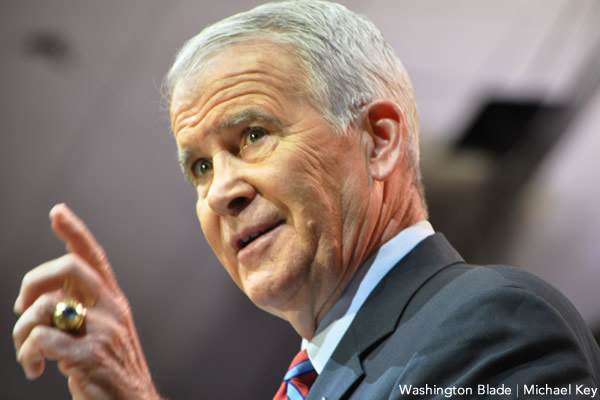
Oliver North speaking at the 2014 Conservative Political Action Conference. (Washington Blade photo by Michael Key)
North also made a veiled criticism of “Don’t Ask, Don’t Tell” repeal, saying the administration is treating U.S. troops like “laboratory rats” as part of a “social experiment.”
These conservative activists are pushing back against the advancement of marriage equality as numerous federal courts — most recently in Texas, Virginia, Kentucky, Utah and Oklahoma — have struck down state constitutional bans on same-sex marriage amid expectations the U.S. Supreme Court will deliver a final ruling on the issue in 2015.
The anticipated resolution of the marriage issue in the courts invoked the ire on stage of Eric Metaxas, a conservative pundit who insisted voters must decide the issue of marriage equality instead of judges.
“The idea of same-sex marriage, the idea of paying for contraceptions, we should let the voters decide,” Metexas said. “This is the United States of America. We don’t need the ‘Mandarins of Justice’ to make these decisions; we’re supposed to trust the voters to make those decisions, and let the voters decide.”
But those considered possible 2016 presidential candidates shied away from the issue of marriage equality.
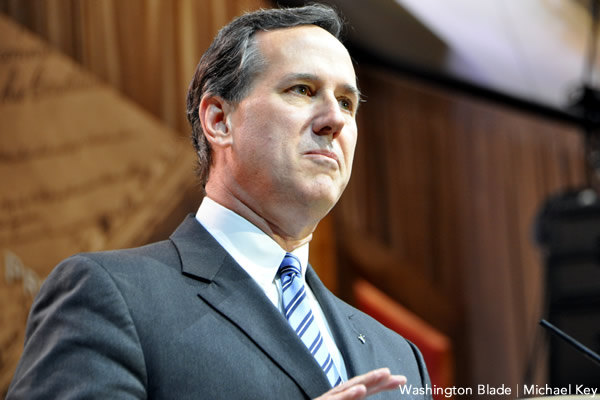
Former Sen. Rick Santorum (R-Pa.) speaking at the 2014 Conservative Political Action Conference. (Washington Blade photo by Michael Key)
Rick Santorum, known for his opposition to same-sex marriage and support for a U.S. constitutional amendment banning same-sex marriage, expressed regret on stage that he became known for that viewpoint over the course of his 2012 presidential bid.
“I don’t want to talk about redefining marriage; I want to talk about reclaiming marriage as a good for society and celebrating how important it is for our economy,” Santorum said to applause.
Santorum continued to discuss the importance of the institution of marriage itself, saying businesses could advance it by offering marriage counseling as a benefit.
Amid the (often disputed) perception that Pope Francis is more lenient on gay rights, particularly after his recent suggestion he could support civil unions, Santorum, who’s Catholic, commended the pontiff for saying the Catholic Church should steer away from social issues.
“He’s going out there and not talking about what the Christian faith is against, he’s going out there and talking about what we’re for,” Santorum said. “He hasn’t changed a single policy. He won’t change a single policy. But what he’ll do is he’ll go out there and talk about the good news to a hurting world because he believes that that’s what the world needs.”
One event at CPAC that demonstrated the tension within the conservative movement on marriage equality, although the discussion wasn’t completely dedicated to the issue, was a panel titled, “Can Libertarians and Social Conservatives Ever Get Along?”
One question debated was protecting religious liberties of individuals as marriage equality advances. The issue for panelists wasn’t so much whether there should be marriage equality, but whether it should be imposed by judicial fiat.
Michael Medved, a conservative pundit and host of “The Michael Medved Show,” said the issue has come down to religious liberty and insisted social conservatives and libertarians should agree that states should be able to decide for themselves the marriage issue without interference from the federal government.
“The idea that New York and California may have legitimated, or recognized, decided that those states should sponsor gay marriage doesn’t mean that Texas should be compelled by overreaching courts, or anyone else, to sponsor and legitimate gay marriage,” Medved said.
Alexander McCorbin, executive director of Students for Liberty, represented the opposite end of the conservative spectrum and said on the panel that marriage equality is “the civil rights issue of the 21st century.”
“There’s state-sponsored discrimination against various associations between individuals,” McCorbin said. “We’re talking about the denial of basic rights and privileges of individuals in committed relationships — the only difference being their sexual orientation.”
But McCorbin was rebuked on stage by Medved, who said believing a fundamental right to same-sex marriage is inconsistent with libertarianism.
“You are saying that nine unelected judges should impose their will and their judgement on the sovereign states, all 50 sovereign states and the citizens therein, in terms of something as fundamental to society as the definition of family and the definition of marriage,” Medved said.
Making a point that was derided by gay bloggers and the watchdog group Media Matters, Medved also said the idea that any state had prohibited same-sex marriage is “a liberal lie” — possibly because same-sex weddings have been allowed, even though 33 states don’t recognize them as valid.
But Medved also signaled he nonetheless supports adoption by same-sex parents, which triggered applause in the audience (although one observer could be heard booing).
Matthew Spaulding, associate vice president of Allen P. Kirby Jr. Center for Constitutional Studies & Citizenship, insisted that religious liberties for objectors must be upheld and denied any link between same-sex marriage and interracial marriage.
“The fact of one’s color of one’s skin is a coincidence,” Spaulding said. “It has nothing to do with your character, right? The difference between a male and a female is something that is self-evident and obvious that we need to deal, and we can’t shut aside and turn it over to judges to tell us what to do.”
No one who is gay, nor any LGBT political group, had a voice on the panel despite its attention to the marriage issue. In an op-ed penned earlier this week in the Daily Caller, Log Cabin Republicans executive director Gregory Angelo asserted he had sought participation on a CPAC panel this year, but was rebuffed because the American Conservative Union, which runs the event, never responded to the request.
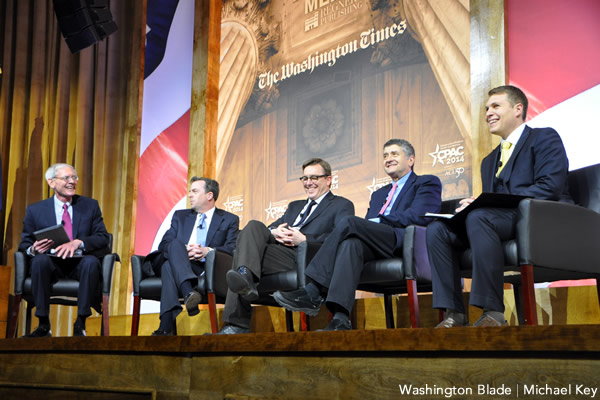
Members of the CPAC panel, ‘Can Libertarians and Social Conservatives Ever Get Along?’ discussed same-sex marriage. From left, Tom Minnery of CitizenLink, Matt Spaulding of the Allen P. Kirby Jr. Center for Constitutional Studies & Citizenship, Matt Welch of Reason Magazine, Michael Medved of the ‘Michael Medved Show’ and Alexander McCorbin of Students for Liberty. (Washington Blade photo by Michael Key)
Ignoring the issue of marriage, prominent Republicans speaking before the panel chose to tackle other issues, although they weren’t afraid to take Obama to task.
Texas Gov. Rick Perry, a known opponent of LGBT rights including allowing openly gay people in the Boy Scouts, turned his attention to deriding the advancement of welfare states under the Obama administration.
“The vision that wins out — either this big-government, protectionist nanny state version offered by liberal leaders or the limited-government, unsubsidized, freedom state offered by conservative leaders — will determine the future of our nation,” Perry said.
Sen. Rand Paul (R-Ky.), who has a reputation as a libertarian, delivered a speech criticizing the exposed data collection by the National Security Agency as he urged adherence to the U.S. Constitution.
“There is a great battle going on, it’s for the heart and soul of America,” Paul said. “The Fourth Amendment is equally as important as the Second Amendment, and conservatives cannot forget this.”
Even 2008 Republican presidential candidate turned Fox News commentator Mike Huckabee, known for championing social issues, was silent on stage about the issue of marriage equality, although he spoke more generally about upholding religious liberties in the country.
This struggle over gay rights emerges at CPAC following the publication this week of a Washington Post-ABC News poll showing a record-high 59 percent of Americans support same-sex marriage, while only one-in-three Americans oppose it.
That support is even higher among young voters, which make up the preponderance of attendees at CPAC. The poll found three-quarters of Americans younger than 30 support same-sex marriage.
Following the speeches on Friday, Log Cabin’s Angelo said there’s only one way for the debate to end if the conservative movement wants to thrive.
“The conservative movement can keep its head in the sand at its own peril — with the potential to lose more votes — or it can acknowledge us as here to stay, and grow the base, especially among millennial voters,” Angelo said. “That’s where we’re at in this movement. We want conservatives to win, but they need to acknowledge us as part of that winning coalition.”
United Kingdom
UK Supreme Court rules legal definition of woman limited to ‘biological women’
Advocacy groups say decision is serious setback for transgender rights
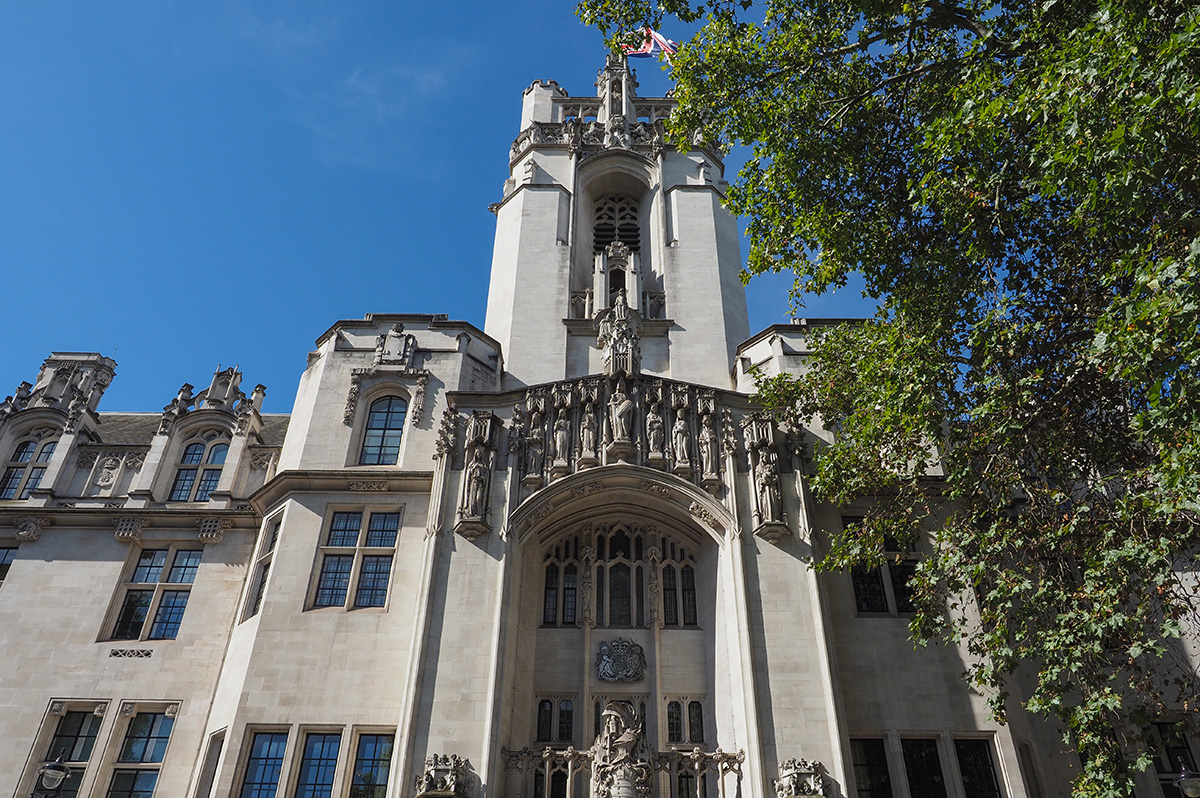
The British Supreme Court on Wednesday ruled the legal definition of a woman is limited to “biological women” and does not include transgender women.
The Equality Act that bans discrimination based on sexual orientation and gender identity took effect in 2010.
Scottish MPs in 2018 passed a bill that sought to increase the number of women on government boards. The Supreme Court ruling notes For Women Scotland — a “feminist voluntary organization which campaigns to strengthen women’s rights and children’s rights in Scotland” — challenged the Scottish government’s decision to include trans women with a Gender Recognition Certificate in its definition of women when it implemented the quota.
Stonewall U.K., a British advocacy group, notes a Gender Recognition Certificate is “a document that allows some trans men and trans women to have the right gender on their birth certificate.”
“We conclude that the guidance issued by the Scottish government is incorrect,” reads the Supreme Court ruling. “A person with a GRC (Gender Recognition Certificate) in the female gender does not come within the definition of ‘woman’ for the purposes of sex discrimination in section 11 of the EA (Equality Act) 2010. That in turn means that the definition of ‘woman’ in section 2 of the 2018 Act, which Scottish ministers accept must bear the same meaning as the term ‘woman’ in section 11 and section 212 of the EA 2010, is limited to biological women and does not include trans women with a GRC.”
The 88-page ruling says trans people “are protected by the indirect discrimination provisions” of the Equality Act, regardless of whether they have a Gender Recognition Certificate.
“Transgender people are also protected from indirect discrimination where they are put at a particular disadvantage which they share with members of their biological sex,” it adds.
Susan Smith, co-founder of For Women Scotland, praised the decision.
“Today the judges have said what we always believed to be the case, that women are protected by their biological sex,” she said, according to the BBC. “Sex is real and women can now feel safe that services and spaces designated for women are for women and we are enormously grateful to the Supreme Court for this ruling.”
Author J.K. Rowling on X said it “took three extraordinary, tenacious Scottish women with an army behind them to get this case heard by the Supreme Court.”
“In winning, they’ve protected the rights of women and girls across the UK,” she added.
It took three extraordinary, tenacious Scottish women with an army behind them to get this case heard by the Supreme Court and, in winning, they’ve protected the rights of women and girls across the UK. @ForWomenScot, I’m so proud to know you 🏴💜🏴💚🏴🤍🏴 https://t.co/JEvcScVVGS
— J.K. Rowling (@jk_rowling) April 16, 2025
Advocacy groups in Scotland and across the U.K. said the ruling is a serious setback for trans rights.
“We are really shocked by today’s Supreme Court decision — which reverses 20 years of understanding on how the law recognizes trans men and women with Gender Recognition Certificates,” said Scottish Trans and the Equality Network in a statement posted to Instagram. “The judgment seems to have totally missed what matters to trans people — that we are able to live our lives, and be recognized, in line with who we truly are.”
Consortium, a network of more than 700 LGBTQ and intersex rights groups from across the U.K., in their own statement said it is “deeply concerned at the widespread, harmful implications of today’s Supreme Court ruling.”
“As LGBT+ organizations across the country, we stand in solidarity with trans, intersex and nonbinary folk as we navigate from here,” said Consortium.
The Supreme Court said its decision can be appealed.
District of Columbia
Two charged with assaulting, robbing gay man at D.C. CVS store
Incident occurred after suspects, victim ‘exchanged words’ at bar

D.C. police just after 1 a.m. on April 10 arrested two men for allegedly assaulting and robbing a gay man inside a CVS store at 1418 P St., N.W., according to a police report and charging documents filed in D.C. Superior Court.
The charging documents state that the alleged assault and robbery occurred a short time after the three men “exchanged words” at the gay bar Number 9, which is located across the street from the CVS.
The arrested men are identified in the charging documents as Marquel Jose Diaz, 27, of Northwest D.C., and Lorenzo Jesse Scafidi, 21, of Elizabeth City, N.C. An affidavit in support of the arrest for Diaz says Diaz and the victim “were previously in a relationship for a year.”
Court records show Diaz was charged with Simple Assault, Theft Second Degree, and Possession of a Controlled Substance. The court records show the controlled substance charge was filed by police after Diaz was found to be in possession of a powdered substance that tested positive for cocaine.
Scafidi was charged with Simple Assault and Theft Second Degree, the court records show.
The D.C. police report for the incident does not list it as a suspected hate crime.
The court records show both men pleaded not guilty to the charges against them at a Superior Court arraignment on the day of their arrest on April 10. The records show they were released by a judge while awaiting trial with an order that they “stay away” from the victim. They are scheduled to return to court for a status hearing on May 21.
The separate police-filed affidavits in support of the arrests of both Diaz and Scafidi each state that the two men and the victim “exchanged words” inside the Number 9 bar. The two documents state that both men then entered the CVS store after the victim went to the store a short time earlier.
Scafidi “came into the CVS shortly after and entered the candy aisle and slammed Complainant 1 [the victim] to the ground causing Complainant 1’s phone to fall out of CP-1’s pocket,” one of the two affidavits says. It says Scafidi “again picked up CP-1 and slammed him to the ground.”
The affidavit in support of Diaz’s arrest says Diaz also followed the victim to the CVS store after words were exchanged at the bar. It says that after Scafidi allegedly knocked the victim down in the candy aisle Diaz picked up the victim’s phone, “swung on” the victim “while he was still on the ground,” and picked up the victim’s watch before he and Scafidi fled the scene.
Without saying why, the two arrest affidavits say Diaz and Scafidi returned to the scene and were arrested by police after the victim and at least one witness identified them as having assaulted and robbed the victim.
Attorneys representing the two arrested men did not respond to phone messages from the Washington Blade seeking comment and asking whether their clients dispute the allegations against them.
The victim also did not respond to attempts by the Blade to obtain a comment from him. The police report says the victim is a resident of Fairfax, Va.
El Salvador
Gay Venezuelan makeup artist remains in El Salvador mega prison
Former police officer said Andry Hernández Romero was gang member because of tattoos

A new investigation points to a discredited, former police officer who played a “key role” in the wrongful deportation of Andry Hernández Romero, a gay asylum seeker and makeup artist who was sent to a maximum security mega prison in El Salvador under Trump’s Alien Enemies Act.
USA Today found in a recent investigation that the former Milwaukee police officer who filed the report about Hernández, citing his tattoos as the reason for the gang affiliation, has a long history of credibility and disciplinary issues in his former police officer position.
The private prison employee who previously worked as a police officer until he was fired for driving into a house while intoxicated — among other alcohol-related incidents — “helped seal the fate” of Hernández.
The investigation by USA Today found that the former police officer accused Hernández of being a part of the Tren de Aragua gang because of his two crown tattoos with the words “mom,” and “dad,” which are now being identified as Venezuelan gang-related symbols.
Since then, his story has made headlines across the nation because Hernández has no criminal record and is legally seeking asylum in the U.S. due to credible threats of violence against him in Venezuela because of LGBTQ persecution.
He was targeted shortly after Trump invoked the Alien Enemies Act of 1798, which is a proclamation for all law enforcement officials to “apprehend, restrain, secure, and remove every Alien Enemy described in section 1 of [the] proclamation.”
Charles Cross, Jr., the former police officer, signed the report which wrongfully identified Hernández as a gang member. Cross was fired in 2012 after many incidents relating to his credibility and how it was affecting the credibility of the department to testify in court.
He had already been under investigation previously for claiming overtime pay that he never earned. In 2007, he had also faced criminal charges for damage to property, according to court records.
In March, the Washington Blade spoke with the Immigrant Defenders Law Center Litigation and Advocacy Director Alvaro M. Huerta regarding the case and stated that “officials with U.S. Immigration and Customs Enforcement and U.S. Customs and Border Protection alleged his organization’s client was a member of Tren de Aragua, a Venezuela-based gang, because of his tattoos and no other information.”
Hernández came to the U.S. last year in search of asylum and now makes up one of 238 Venezuelan immigrants who were deported from the U.S. to El Salvador, Honduras and Venezuela. Many of those being deported are being sent to the Center for Terrorism Confinement, a maximum-security mega prison in El Salvador, which has been accused of human rights violations.
According to the investigation, the Department of Homeland Security “wouldn’t offer further details on the case, or the process in general, but reiterated that the department uses more than just tattoos to determine gang allegiance.”
His story is now being looked at as a cautionary tale of the lack of due process of law the U.S. government is taking, as the Department of Homeland Security and Immigration and Customs Enforcement ramp up deportations across the nation.
Organizations like the Human Rights Campaign are now calling for Secretary of State Marco Rubio and Secretary of Homeland Security Kristi Noem to cease wrongful deportations and return Hernández home. The petition also urges the U.S. government to afford all Americans, forging nationals and asylum seekers residing in the U.S., due process of law as required by the Constitution.
-

 The White House5 days ago
The White House5 days agoWhite House does not ‘respond’ to reporters’ requests with pronouns included
-

 District of Columbia2 days ago
District of Columbia2 days agoReenactment of 1965 gay rights protest at White House set for April 17
-

 Hungary2 days ago
Hungary2 days agoHungarian MPs amend constitution to ban public LGBTQ events
-

 Maryland2 days ago
Maryland2 days agoFreeState Justice: Transgender activist ‘hijacked’ Moore’s Transgender Day of Visibility event

